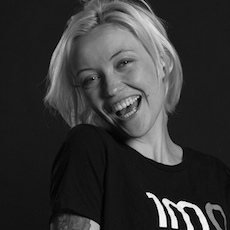On Wednesday night, the 1 Million Women team was lucky to be invited to the screening of The Human Experiment documentary in Sydney.
The documentary and the event were about the omnipresence of toxic chemicals in our environment, we didn't know exactly what to expect and we have to admit, we were shocked to find out what is really happening.
We listened to some of Australia's most passionate wellness experts: Tabitha McIntosh, naturopath and clinical nutritionist, Danielle Shirley, pharmacist, herbalist and founder of the Naturally home online store, Therese Kerr, Miranda Kerr's mum, advocate for holistic family health and founder of the certified organic personal care line Divine, and Bill Statham, researcher and writer with an interest in health education. The guest speakers shared some scary facts about chemicals polluting our environment, our lives and our health, and we all left the event empowered about what to do to make changes, to reduce our chemical exposure and live a chemical-free life.
Detailing the alarming use of chemicals in society, in our personal, skin, hair, beauty, food, clothes and general household items, the documentary showcased the growth and power of the chemical industry and made us wonder: Have we unwillingly and unknowingly become part of the Human Experiment?
One thing was clear for us after the movie: politicians and chemical companies care more about their bottom line than our personal health, and the one of our environment. Which is why it is crucial for women and people around the world to be informed of what's really going on, so that they can take action and make the right decisions about what to buy and what not to buy.
Researchers have found more than 300 chemicals in the umbilical cord blood of newborn babies, rendering them pre-polluted even before birth! The reality is, thousands of untested chemicals are in our everyday products, our homes and inside of us. At the same time, the prevalence of many conditions such as infertility, cancers, asthma, skin diseases, endocrine-disruptive illnesses, ADHD, allergies, autism etc. continues to rise. Some chemicals have been proven by scientific studies to be linked to the increase of these types of conditions, so you might be wondering, why are these chemicals still being used in so many products we use on a daily basis?
Unfortunately in Australia (like America), we are on the side of industry, assuming products or chemicals are safe until proven otherwise. In Europe the opposite is true and they use a precautionary principle. Hundreds of chemicals have been banned in the EU and are still widely used in Australia, that's a scary fact!
The average women uses between 9 and 15 different personal care products even before leaving her house in the morning, containing over 100 different chemicals, including some linked to cancer and reproductive harm. There are now currently over 10,500 chemicals alone found in skin, hair, beauty and personal care products and only 13% of these chemicals have ever been tested for safety in cosmetics over the last 30 years. Cleaning products, furniture, kids' toys and products, cooking utensils… so many of the things we use every day are full of toxic-chemicals, we are not aware of their presence and some are harmful for our health, the health of our children, our environment and the planet in general.
So what did we learn? How can we reduce the amount of chemicals we are in contact with every single day, and move towards a chemical-free and healthy life?
- Make Safer Choices.
Every dollar you spend is a vote you make for safer products. Become a conscious shopper, look at labels, buy certified organic products (not just products that contain organic ingredients as they can also contain harmful chemicals, check the labels), both for food and personal care products. This is especially important if you're pregnant, breastfeeding or have young children, as they will absorb more chemicals than adults, and are in crucial development stages of their lives.
Download this great guide from Awaken your Health about how you can easily reduce your chemical exposures.
Some ideas for safer products can be found on the Naturally home website , you can find certified organic cosmetics in many retail store and on Therese Kerr's website .
- Inform Yourself.
Do your research, and as we mentioned above, read the labels. You can read some books or websites about dangerous chemicals. You can download the Chemical Maze app or get the book , to help you instantly identify dangerous food additives and cosmetics ingredients with ease.
- Speak Up:
Urge your elected representatives to make sure that health and safety regulatory agencies are not captive of the industries they regulate and have sufficient power to protect our health. Spread awareness about what you've learnt and share the message with your friends and family.
Click here to read more about The Human Experiment movie.
Here are some reactions from the 1 Million Women community who attended the screening:
“It's frustrating and frightening to learn about the way chemical regulation fails us as consumers. It is not possible for an average person to know about the tens of thousands of chemicals that are used in our day to day products, and be expected to weigh up the potential risks of them. Logically, shouldn't our government regulate and limit the chemicals used in products and production which could or are proven to have negative health impacts? I'd think so, and I urgently hope this happens."- Lola, 1 Million Women supporter
"The Human Experiment is an incredible eye-opener to the values of modern society and industry. I urge anyone who cares about their environment and personal health to see this documentary and take a stand against the chemical product industry."- Ayla, 1 Million Women supporter

